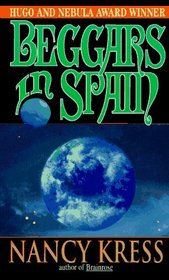Helpful Score: 4
Beggars in Spain has a really interesting premise: genetically engineered humans who never need sleep. It makes them fantastically productive, most being extremely bright. A few of them were just anomalies, but as their numbers increased, they became targets of bigotry and hatred. The Sleepness community is not perfectly united in their goals, however. Nancy Kress explores genetic manipulation, racial attitudes (are the Sleepless another race?), hatred toward minorities, among other ideas. A great book, but somehow I ended up with three copies!
Helpful Score: 4
This is the first of a trilogy about genetic engineering & how it affected society in the US. The books definitely should be read in order. Alot happens in each book. Interesting if one likes detailed characters.
Helpful Score: 3
In addition to being one of the most interesting people on the planet, Nan Kress is a fine writer. If you're an insomniac, watch out. The future may not look quite so bright.
Helpful Score: 3
This trilogy basically centers around "What if there was a group of people who didn't need to sleep?" From there, she explores what's good about being different, and what's really bad about being different. I found all three books to be fascinating and very entertaining.
Helpful Score: 2
The premise of this sci-fi novel is that, in 2008, a scientific breakthrough allows for genetic engineering that creates people with no need to sleep. Together with other genetic advantages available to the rich, soon this creates a small but growing group of privileged and brilliant young people - the Sleepless. However, jealous and resentful, "ordinary people" rather than appreciating the super-talented Sleepless, are soon viciously prejudiced against them.
I found the first half of this book to be interesting and refreshing, because, although I didn't find the supposed benefits that Kress pairs with sleeplessness to be medically convincing, it was nice to see (for once) a scientific advance that has the ability to change humanity shown in a positive light, rather than as a Scary Mutation of Terror that makes us Inhuman.
However, the second half of the book spoiled all that, when it posits that a large percentage of the Sleepless, sick of the bigotry aimed at them, secede into a gated compound, and proceed to do more genetic research and create Inhuman Mutations and commit Terrible Acts. By taking the idea further, I felt that the novel, conversely, got more ordinary.
I found the first half of this book to be interesting and refreshing, because, although I didn't find the supposed benefits that Kress pairs with sleeplessness to be medically convincing, it was nice to see (for once) a scientific advance that has the ability to change humanity shown in a positive light, rather than as a Scary Mutation of Terror that makes us Inhuman.
However, the second half of the book spoiled all that, when it posits that a large percentage of the Sleepless, sick of the bigotry aimed at them, secede into a gated compound, and proceed to do more genetic research and create Inhuman Mutations and commit Terrible Acts. By taking the idea further, I felt that the novel, conversely, got more ordinary.




